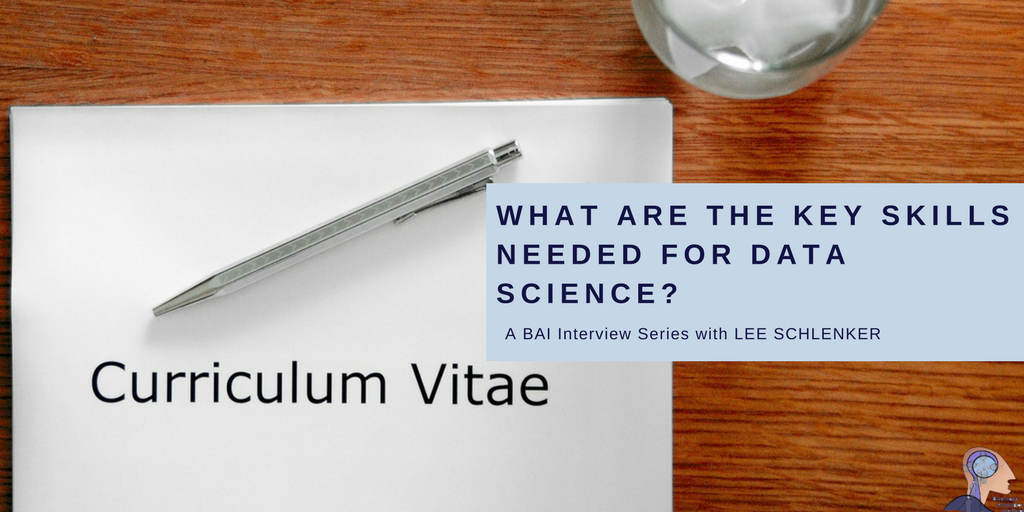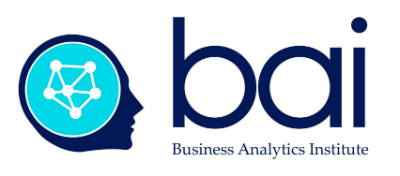
In the fourth installment in the Business Analytics Institute series of Data Science interviews, we talk to Lee Schlenker. He is a Professor of Business Analytics and Community Management, as well as one of the Principals in the Business Analytics Institute. His research interests include analytics, decision-making, and community management. We talked with him about Data Science skills and the data culture in business.
As a practitioner, speaker, and consultant, I strive to help students and practitioners of management understand how data can improve managerial decision making. In my graduate and executive conferences and assignments, my vision of data science - “Business Analytics 4.0” - is built upon four pillars: understanding what role data plays in today’s economy, examining the cognitive processes that intimately condition human decision-making, applying machine-learning to the specific types of problems businesses are trying to solve, and helping them transform data into actionable decisions. In the past week, the Business Analytics Institute has been interviewing professionals about technical, cognitive and business skills in Data Science and how HR can identify the right candidates. Here, I would like to offer my thoughts on the importance of these skills in Data Science.
Trade skills refer to an understanding of the business logic, organization, and monetization of company resources in each market. A data science manager needs to have a good background in business in order analyze how data reflects the realities of business practice.
Management is primarily about helping internal and external customers take better decisions. Since human decision-making is influenced, by perceptions of risk, uncertainty, and ambiguity, the role of data science Is to assist management in taking the best decision based given the nature of the problem(or opportunity) that they are facing. Data Science is a mindset rather than skill set- a management candidate needs to demonstrate his or her ability to“solve” business problems through the analytic method: evaluating the context(logic of the industry and the corporate business model), to identify the roots of the problem, evaluating the quality of the data at your disposal, choosing the right methodology to address the problem, and leveraging data to create the conditions for collective action.
Technical skills, in referring to data science and management, are much more than computer know-how; it's knowing the algorithms and technologies used in the industry and how to apply them to the business' needs.
Technical skills cover much more than computer know-how– technology is a synonym for the tools we use to interact with our customers and organizations. Before looking at software and algorithms, managerial candidates need to grasp how technologies are used in the industries and organizations in which they hope to work. These technologies are indeed evolving as innovations in digital transformation take hold– the foundations of competitive advantage spring from how current technologies capture, aggregate and communicate data, as well as how the analytical methodologies behind machine learning facilitate sense-making. This final point is essential in judging how much technical expertise a manager should know- the candidate should know enough about data, data stores, algorithms, and software to help his or her customers make sense of the data at their disposal.
Cognitive skills refer to an understanding of how people interpret the data they see, as well as how they use data to incite action. People look at data from different angles, a good data science manager looks for solutions in the data presented within the context of the problem at hand.
The goal of data science isn’t to make machines smarter, but to help people take better decisions. Let’s keep in mind that people program software– the best algorithms are no better than the people that program them. People look at data from different angles because they see value in different lights. Similarly, the value of our data doesn’t come from the data itself, but from the context in which it’s used. Kahneman and Tversky’ s work in behavioral economics is fundamental here, a manager needs to appreciate how the context in which the data is presented, conditions its perceived value in addressing specific problems. In a similar manner, the Gestalt principles and the various work on visual communications offer keys to how data is, or can be, transformed into action.
HR recruiters should be more analytical in their recruitment and assess the candidates by testing them on real-life data problems in the company they are applying to.
I strongly suggest applying the analytical method to how we approach HR. Since many client companies aren’t exactly sure what skills and competencies they are looking for, recruiters can begin by studying the corporate context to understand which problems or opportunities this position is supposed to address. In evaluating the candidate’s credentials, rather than looking at their C.V., the recruiter would do well to investigate how the candidate’s data trial reveals his or her experience, past assignments, and accomplishments. The interviews themselves can be designed to reflect the types of problems the candidate will face on the job. Finally, his or her visual communications skills should be put on display during the interview process. If a candidate’s knowledge can be tested behind a computer, the candidate’s value to the company should be tested his or her future colleagues.
The best HR agencies today can identify good data scientists by keeping with the latest trends in the field.
We are assuming here that companies or consultancies recruit in a consistent and uniform manner- which unfortunately is rarely the case. Certain project managers and consultants come to mind, and they seem to share considerable experience with both their company’s culture and in working with a data science team. They follow the evolution of the trade and tend to be more focused on problem-solving than following the latest trends in hardware and software. Finally, they often have strong links with both the top universities and professional associations that allow them to monitor the candidate pool that will fill their team’s(or customer’s) future needs.
Lee Schlenker is a Professor at ESC PAU, and a Principal in the Business Analytics Institute http://baieurope.com. His LinkedIn profile can be viewed at www.linkedin.com/in/leeschlenker. This is part of a series of interviews by the Business Analytics Institute on Data Science and Data Science skills.
Read our other interviews with Data Science professionals in the series:
BAI Interview Series: Yves Mulkers on Data Science Skills
http://www.baieurope.com/interview_yves_mulkers
BAI Interview Series: Davy Cielen On Data Science Skills
http://www.baieurope.com/davy_cielen_interview
BAI Interview Series: Dean McKeown on Data Science Skills
http://www.baieurope.com/interview_dean_mckeown

